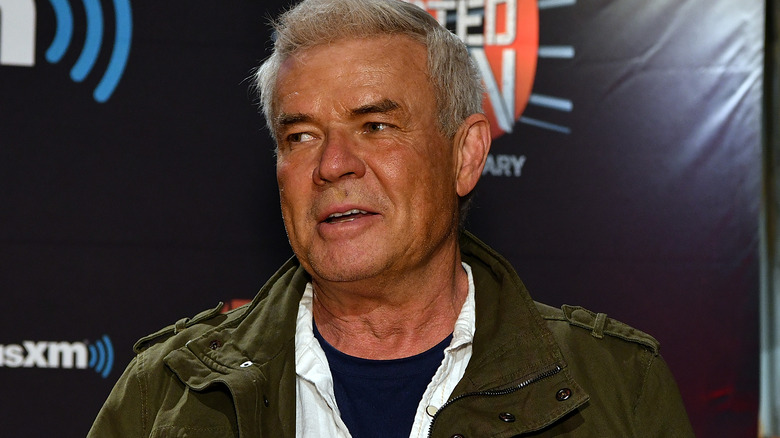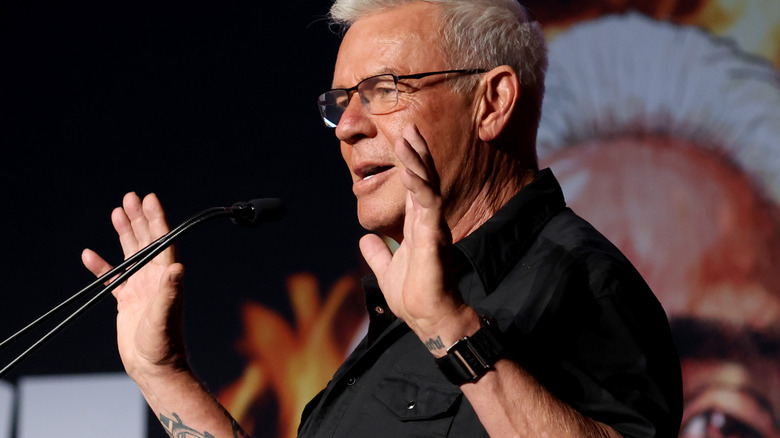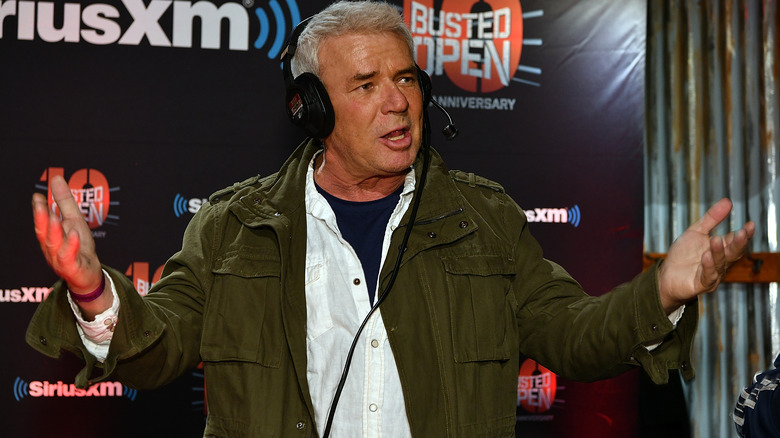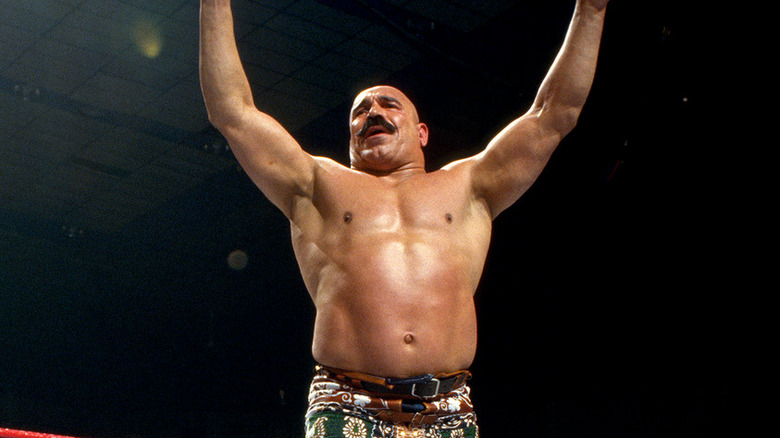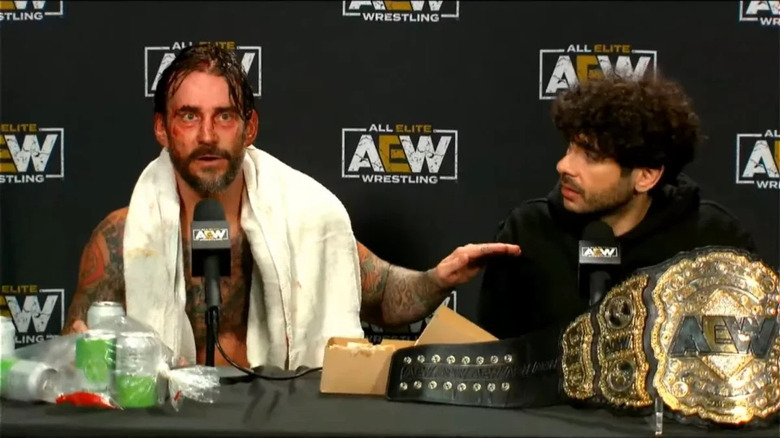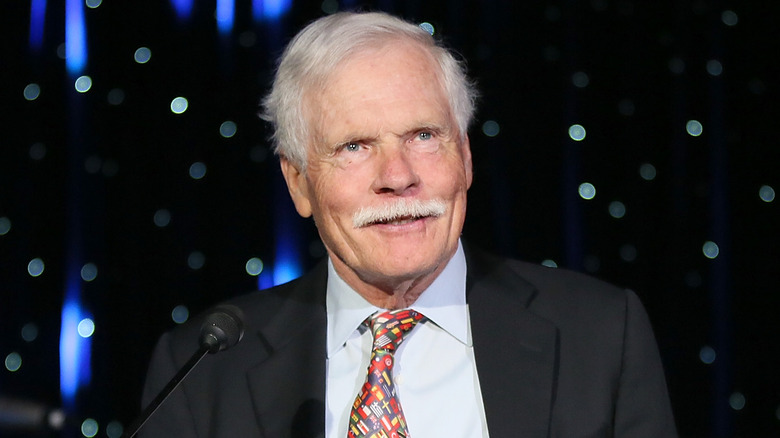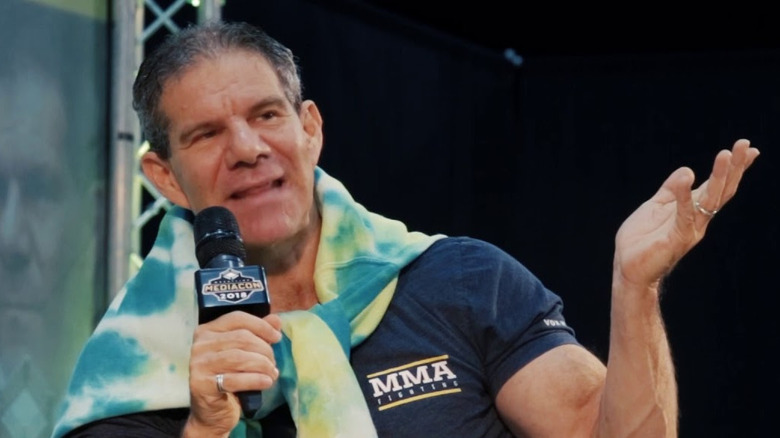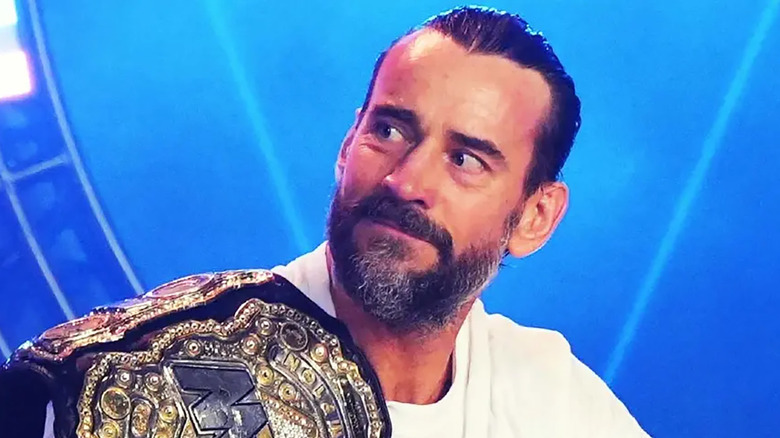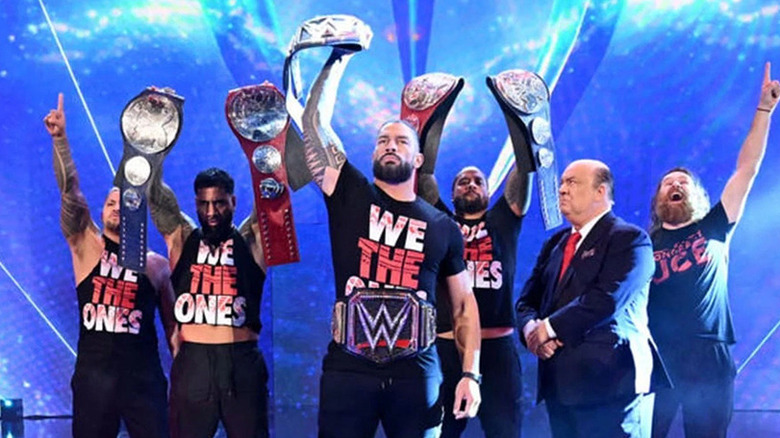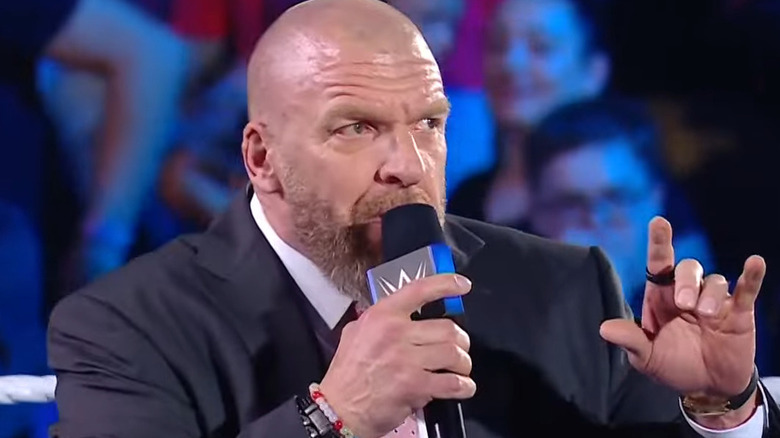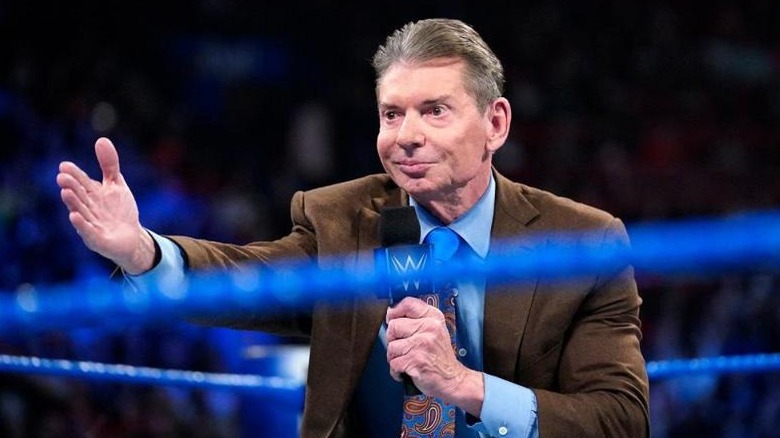Eric Bischoff Talks New Book Grateful, Tony Khan's Handling Of Brawl Out, CM Punk's Value & More - Exclusive
It's been more than 35 years since Eric Bischoff got his start in the professional wrestling industry, and it's been quite the journey, full of both controversy and cash. These days, Bischoff is extremely thankful for the moments he's experienced, and his latest venture allows him to express such appreciation. His new book, "Grateful," was released on November 11, and while the former WCW President has more goals on his agenda, he made sure that this second biography covers his time in the business following his first exit from WWE, from his work in TNA to his entrance into entertainment production with Jason Hervey to his short tenure as creative director for "WWE SmackDown."
In a new interview with Dominic DeAngelo of Wrestling Inc., Bischoff discusses how his co-author, Guy Evans, inspired him to write a second book, All Elite Wrestling's infamous All Out weekend, the state of wrestling media, what he's noticed in Paul Levesque's WWE in comparison to Khan's AEW, and more.
'I thought I was done with the wrestling business'
I listened to a previous interview you just did a couple weeks ago, and you talked about Guy Evans, and obviously you have a relationship with him. He wrote the "Nitro" book and everything like that. Talk about how he kind of sparked in a lot of ways you to get a second book, because initially, like five years ago or so, you were kind of, "I don't know about another book."
It's funny because the first book I did while I was with WWE, "Controversy Creates Cash" ... when I was approached about doing that book, I was like, "Well what? What am I going to talk about? I don't have a book. There's no book in me." And I felt that way because so much of my history in wrestling had already been discussed to death ...
The guy that helped me write the book, his author's name on the book was Jeremy Roberts, but he's a very, very good writer ... and he took my story and he made it a lot more interesting than I thought it could be, or than I realized it actually was, let's put it that way. But I thought, "Okay. That's everything." And when that book came out in whatever it was, 2006, 2007, at that point I thought I was done with the wrestling business. I really, really did. And that's I think a theme that people will probably read in the book "Grateful," is that there's been so many stages in my life, probably going back to, oh, 1993, when I came to the conclusion that, "Okay. My time in this industry is done. It is time to move on." And then for whatever reason I would end up back in it. But I thought by 2006, 2007 for sure, "Okay. Now I'm done. I'm off. I have my own independent production company and my partner and I are doing really well, and I can finally, with a smile on my face, look back at my wrestling career and say, okay. It ended the way I wanted it to end in WWE."
Cut to, I'm back in TNA or back in the wrestling business in TNA, which I definitely did not plan on ... And I want to be clear, because I talked in the book a lot about my frustrations with TNA and the way management in TNA did or didn't do the things that I felt needed to be done. But at the end of the day, it was their business, man. I was just there to provide a service. And as frustrating as it was for me ... I realized that I was grateful for that opportunity, and just because management didn't do the things that I felt they should be done was no reason for me to look back at that time and be angry or frustrated about it, or be anything but grateful, because I got to work with my son and I had a lot of great experiences, and I met some great people, and people that I still count as friends today. But time goes on, I leave TNA, now I'm back in WWE, this time in an executive position for, I refer to it as a cup of coffee, but it was essentially about four months.
And then when that was over, it's like, "Okay. Now I'm really done. There's no way I'm coming back into the wrestling business again."
How Guy Evans Helped Bischoff Become 'Grateful'
And I started doing the podcast. I had actually started the podcast before I went to work with WWE as an executive director in 2019. I was already doing the podcast and the podcast is what really made me... how do I say this? It made me look at my history in wrestling, my past in wrestling, from 2007 to current date, it made me look at it a different way, and it was a process. It didn't start out that way. Anybody that listened to my first four or five podcasts with Conrad knows that they were a little rocky to begin with.
I remember.
A lot of it was me being defensive. It was me being a little bit angry and resentful, and look ... for 25 or 30 years, I've taken a lot of crap from the dirt sheets and online, and I just get tired of it. And when I first started doing the podcast with Conrad, I was very defensive as a result of that, but the podcast ... taught me to have fun with it all. And once I started having fun with it all, I think the audience started feeling that. And Guy Evans listened to the podcast a lot, and he called me one day last summer and said, "Hey, would you ever consider doing another book?" And I said the same thing to him that I've said in the past, which is, "What have I got to talk about?" And then Guy, being on the receiving end as an audience listening to the podcast, said, "Man, I hear you talk about the fact that you're grateful for so many things and you've kind of evolved through this process." He said, "I think that would make a very unique book."
And it didn't take me long to think about that, because it's something that I deal with every single day. It's a process, being grateful, for me. It's a discipline. It's not easy. It doesn't come naturally for me because I'm an A personality. I'm aggressive. I see a problem, I try to kill it. I don't try to solve it, I try to kill it. And I'm grateful for that aspect of my personality, because it's led to a lot of great things for me and my family over the years. But it's also problematic sometimes in dealing with people and situations. So over the years, and my wife has had a lot to do with that, my experience watching Hulk Hogan go through what Hulk Hogan went through, and just being around people that have been through some really challenging times in my life, kind of put everything in perspective for me, and I just started thinking about the wrestling business in a different way, my experience in it. Guy was able to pull a lot of that out of me in a way that would probably not naturally come out in a conversation, just because I'm kind of introverted in that respect. I don't share my emotions and my thoughts very easily, unless it's for entertainment purposes, and then it vomits out. But it was really Guy who, after listening to the podcast and hearing that there'd been a change in my view of things over the years, felt like there'd be a really interesting book there, and that's how it started.
Cracking The QR Code
I think what's really the neat concept about it ... is the QR code inclusion, which I thought is pretty fascinating, and you've even mentioned how on WWE television, Bray Wyatt and how they're all doing that, in a lot of ways incorporating that in. When did that kind of get implemented into the base of the book?
Well, really that's a fascinating kind of story because it wasn't my idea. The idea for putting a QR code in a book came from a gentleman by the name of Brad Balukjian. Brad is a professor of biology in California, and he's also an author. He wrote a book a while back called "The Wax Pack." And I'll butcher this so I'm going to keep it short, but essentially Brad was going through a tough time in his life emotionally. And he was thinking back, I think to his childhood, like we often do. Probably looking for some mental comfort food. And he was thinking back to a point in time when he was younger when he used to collect baseball cards ... He grabbed one of these packages of cards and he went through it, and he decided to go on a several month road trip and go try to find all of the players that were in this particular deck of baseball cards that he had when he was a kid, and then follow-up with them and hear their stories, and it was a fascinating idea. And then he called me, I don't know, about eight months ago and said, "Hey, I'm doing another book and this one's called "The Six Pack" ... He's going to be doing interviews with six or eight of the really key players that were a part of WWE back when Hogan beat the Sheik for the world title, because that was like the big pivot point ...
And in the conversation about this new book that he's writing ... he said, "Hey, I got this idea ... I'd like to, in my next book, include these QR codes. So I could have interviews with these select people at the end of each chapter." He said, "But unfortunately I'm working with a traditional publisher and they're not too keen on the idea because it falls outside of the normal way they do business, blah blah, blah, blah, blah." And I said, "Well, I'm writing a book, and I can do interviews and Brad, it's your idea, but do you mind if I steal it?" It's not stealing if you ask. I didn't steal the idea. I borrowed the idea from him, with permission. And he said, "By all means, go ahead and do it."
So that's where that idea came. I'd like to take credit for it. In the wrestling business, whether it's really your idea or not, if you're the first one to do it or you do it in a visible way, you just take credit for it. Just tell everybody it's your idea. But it wasn't my idea. It was Brad's idea, but I'm really grateful that he felt comfortable letting me try it. And we're in the process now, Guy's conducting a lot of the interviews ... It's a pretty cool idea. Nobody's done it in the wrestling book category yet. I don't know for sure that anybody's ever done it. Perhaps, but it'll be the first time in the wrestling book business that anybody sees anything like that.
Brawl Out and CM Punk
So last time we talked, me and you assessed the CM Punk media scrum and all that stuff. I think a lot of that that came through was, you talked about it yourself too, is how you felt bad for Tony Khan in that situation. And then also I think since then you've given your feedback and everything like that on it. And since then, Tony Khan's been on air and stuff like that, and has been a little defensive in certain ways, but I know from talking to you, and you can add your perspective obviously, you want Tony Khan to succeed in this business and to see how it goes, and I kind of want to just get your opinion on the reaction and his handling of the situation so far, from what you've been able to keep tabs on.
I hesitate to comment on things like that because there's so much going on behind the scenes that none of us know about. So to sit on the sidelines and take shots, or even comment objectively or trying to be objective about something you know nothing about, is just unproductive. I've been on the receiving end of that enough. I don't want to do it to somebody else. So I don't really want to comment too much more on it than I already have. I think it was an unfortunate incident. I think in a way Tony set himself up for it. I think he's probably learned a lot since then and hopefully won't make that same type of mistake again. I did feel bad for him. I had empathy for him. I could imagine how he felt in that moment, and it had to be a horrible few minutes for him, whether he set himself up for it or is responsible for it or not. Nobody's responsible for what somebody else does and says. CM Punk took that upon himself, but creating this situation and the environment that led to it, that's on Tony. And he can accept that or not accept it. It doesn't matter to me. I've got no dog in the hunt.
But look, it appears as though CM Punk is gone. I think I was the one famously that came out and said that CM Punk would be a huge financial flop and hell, I'm right. He's got to be one of the biggest financial flops. Tony and that scrum, "He was a part of this pay-per-view and it did this and he was a part of that and it did this." And it's basically saying that nobody else on that pay-per-view had anything to do with that success. It was all because of CM Punk. I tend to disagree with that. Do I think Punk probably had some uplift in ratings temporarily? Sure he did, but it didn't last long. That's in black and white. You can't argue that part. Now you can argue, I guess if Tony wants to, he can argue incremental success over a period of a couple pay-per-views or licensing or merchandising or whatever. You can argue that, but you're assigning a lot of that increase in success to one guy, and I don't know that that's fair or accurate, but, again, it's none of my business. I don't really care.
'Shut up and wrestle'
I do want Tony to be successful. I take personal exception because I'm a human being. I have feelings. I have an ego. I do. It's relatively healthy, but at times it gets a little out of whack and I got to check myself. But when Tony Khan came out and he kept making comments, "WCW, but I'm not going to make the same mistakes they made." Well, dude. And I didn't react to that initially. I just said, "It's just Tony being Tony. He's trying to get himself over. He is trying to get his company over. I understand that."
But when he came out and made this ridiculous comment about if Ted Turner knew 1% about the wrestling business as Tony Khan did then WCW would still be around. That, to this day, still pisses me off. It was such disrespect to Ted Turner, first of all. Secondly, Tony doesn't have a clue what he was talking about back then. The only thing Tony knows about what happened to WCW is what Dave Meltzer told him. And Dave Meltzer has no clue. So for Tony to come out and say something like that was disrespectful to Ted, to me — not to me, to WCW as a whole. And at that point I kind of went, "I've sat back and taken this silliness for a while now, and I'm just going to come out and say what I feel, which is shut up and wrestle." Quit comparing yourself, Tony, to WWE, because he hasn't done it a lot lately because I think he's kind of figured out that's not a good idea. But in the beginning it was... I heard, and I'm not going to mention names here because I don't want to start more crap than already exists, but a very prominent personality on the roster come out and say, "Yeah, within one year we're going to overtake WWE." And I love that kind of bravado and challenge if you are really competing. But it's like me saying, "Me and my buddies here that like to play flag football over Thanksgiving in Wyoming, we're going to beat the Philadelphia Eagles! We're better than them. We really are! Well, we're never going to play them. We're not going to really compete with them, but we're better than them."
And that to me was like, "Oh man. Don't do that. Don't do that." And I kept thinking that all the time I'm reading this stuff and hearing Tony talk about being better than WWE and kind of crapping on the competition, or even referring to them as competition, which I found kind of hilarious. But at that point I'd heard enough and I'd kind of taken enough, and I just came out and said, "Man, just shut up and wrestle. Do your thing. Be a better product. Quit talking about being a better product and just be a better product. Let the audience decide if you are a better product or not because they will."
The audience will vote with their remote. That's a great thing about television. If you're better, they'll follow you. If you're better, they will come. We prove that. It can happen. But only if you deliver, not if you just talk about it. And that comment from Tony about Ted Turner and disrespecting Ted and disrespecting WCW just kind of tipped me over. I vomited my emotions and my reactions publicly, and that's what kind of started the whole thing. But I don't regret it. I know I was right.
Dave Meltzer, Wrestling Media, And Fair Coverage
Well that's the thing too about having a platform is like, and we're hearing about it a lot today too with Road Dogg and Bret Hart, is just like, "Hey, you speak an opinion, you give an opinion, that's what the platform's for."
Well, I think what's different is people are now getting used to the fact that this thing called podcasting, which it's seven, eight years old, really. Steve Austin was probably one of the first wrestlers to do it on any kind of a large scale and it's been growing ever since. But a lot of the people that would write about wrestling, whether it was Meltzer or anybody else — I pick on him because he deserves it the most. And by the way, I don't want to give anybody the impression that I lump all people who cover wrestling in the same category as Dave Meltzer. I don't. Mike Johnson, Dave Scherer, Wade Keller — I used to have issues with Wade, but he's really, really become much more professional over the last 10 years or so. Just to name a few. Jason Powell. These are people that I know that have contacted me to verify stories before they published.
And when I gave them my opinion or my perspective, they chose whether or not to go forward with a story and they didn't, in most cases, or if they did, they did it with my perspective and acknowledged it. And at that point, I've got all the respect in the world for them. Cover it fairly. If you're covering anything, whether it's wrestling or politics or entertainment or whatever, just do it fairly and honestly and keep your personal agendas and your social challenges behind you and off the table and just cover this stuff straight. And there are a lot of guys that do it, but there are some that don't. Dave Meltzer is the king of those.
And with social media as a platform too, it's another outlet that just blows more context and further things and less research getting taken, all that kind of thing as well.
And all of the sudden now guys like Road Dogg, myself, Bruce Prichard, we all have the ability to go, "Oh, wait a minute. For 30 years you've been pounding your chest about this stuff, and by the way, you're really, really wrong, and here's why." And now you get to hear from both sides, and I think that's really important to the wrestling fan. They should hear both sides of the story.
Is CM Punk A Worthwhile Commodity In WWE?
Now you talked about CM Punk leaving. Do you think, in the [ecosystem] of WWE, would he be somebody that's a viable commodity for them, or would that be, given the track record and what you've seen, would you be like, "Ah. I might stay clear."
I don't know. Again, I don't know what Paul Levesque is thinking. I don't know what their plans are or their strategies. So I have no idea. I can tell you from my perspective, I wouldn't touch him with a 10-foot pole. I think CM Punk had a mystique because of WWE and because of the pipe bomb interview, and because he walked out. That created this aura and mystique that Tony brought to AEW and took advantage of for a minute. And once that mystique was gone, once you let the air out of the balloon and now you're just performing every week, I didn't see it in Punk. I just didn't see it in him as a character. I didn't see it in him in the ring. He was good, but he wasn't phenomenal. He wasn't great. And once you take that mystique away and you're just looking at that guy, who's by the way very fragile. He's old, he's fragile, he was never in great shape to begin with. He didn't start out as an athlete. And now at [44] years old, he's fragile as hell. So what would you do, especially in WWE where the intensity and the physicality and the schedule is so much more than it is in the AEW, just your workload.
Without the mystique, and I think CM Punk pretty much crapped the bed the way he handled himself. I think the audience has kind of turned on him. I'm sure he still has some diehard fans out there and all that, everybody does, but the general audience, I think he left a really bad taste in their mouth, and they realize that that mystique is no longer there and he's just another guy. So I don't see the value. I can't imagine it. But I've been wrong a lot, so who knows? Maybe I'm wrong about that.
Comparing The Bloodline To The NWO
Well, something you weren't wrong about, obviously, was the incorporation of the nWo. A big faction in today's day and age is The Bloodline. And I think from my own perspective, I think it's really well executed and lot of layers to the members of the group and everything like that. Where would you assess them as an all-time faction in comparison to the NWO and DX and anything, the Horsemen even, or anything to that level of things so far?
It's hard to make a fair comparison. I think the nWo worked as well as it did for as long as it has, including today ... It transcended into pop culture. Not just here in the States, but around the world. I'd walk around in Japan and I'd see people that were wearing nWo shirts. Probably didn't even know what it meant, but they were wearing it because it was cool. I don't think any other wrestling faction has achieved that level of success in that way, but look, the nWo was unique. It was like the tip of the spear of the Monday Night Wars, even though the War started before '96. The War really started in September '95 when we launched Nitro head-to-head.
That's when it started, and then it escalated, but when the nWo hit and Hulk Hogan turned heel and it really took on a life of its own, that was a very special time in wrestling. Just because of culturally and the way television is now, and just everything else, I don't think we're going to see that kind of impact from any wrestling idea again. I don't think we're going to see another Rock or another "Stone Cold" Steve Austin, people that have completely changed the dynamic of the industry. I don't think we're going to see that again, just like we won't see something like the nWo again. And I think it's unfair to compare anything, any new faction or existing faction, to the nW,o because it's a different world and it's not fair comparing any longer.
The way people access things nowadays and how everything's so oversaturated and spread out ... it's apples and oranges in a lot of ways with that stuff.
Yeah. A different time and a unique circumstance. I don't think that there's ever going to be a circumstance again where a television network, in AEW's case, Turner, would be willing to go head-to-head, even if Tony wanted to, which I don't think he does ... I don't think we're ever going to see that again. And without seeing that, without seeing that a new version of a real Monday Night War, not a cosplay war, but a real war where people are going head-to-head and they're competing for market share, literally, on a minute-by-minute basis, without that energy ... look, there were people that were huge WWE fans that was hoping I would get run over by a bus during that time. There were people who were WCW fans who couldn't wait for me to put WWE out of business. That was the level of involvement and passion that existed during the Monday Night Wars, which is why people are still talking about it today. But I don't think we're going to see that again. And without that level of intensity amongst the audience, it will be hard for anyone or anything to break out and compete with ... all the things that came out of the Nitro/Attitude era.
Paul Levesque's WWE vs. Tony Khan's AEW
I like what I see in WWE. I don't watch it a lot, I'm not taking notes, but I'm seeing consistency. I'm seeing layers of story. I'm seeing layers of entertainment. Look at Sami Zayn. Sami Zayn is emerging to be one of my favorite characters on television right now. And it just makes everything more interesting. The White Rabbit gimmick. There's just so many new things that we've not seen before and layers of entertainment that are fresh and new in WWE that I'm excited about WWE again.
I don't know Paul Levesque really well. I really don't. Although we kind of worked together in proximity for a long time, I never really got to know Paul Levesque, but my sense is that Paul, he's enough of a traditional wrestling guy to see the value in great characters and great story, but he's been mentored by the best in the industry and has probably a greater appreciation for story structure and discipline now than he may have 20 years ago. And I think we're seeing that kind of manifest in the current product. Whereas when I look at AEW, I'm looking at something that I've seen all that before. There's nothing new going on there. There's nothing innovative going on there. There's great talent. There's no question about it. There's a lot of great talent, but the presentation is pretty 1990s. The athleticism is greater, the characters are a little bit edgier and less cartoonish, but that's been going on since 1996. That's not new.
So I'm just waiting for Tony to find something to make that product feel different than the WWE so that wrestling fans go, "Huh? Yeah. It's not WWE, but it's pretty cool because they're doing this now." I just don't see the this now quite yet. And maybe it'll come. I think the world of Chris Jericho as a pro and like him a lot as a person. Jake Roberts is there. Jeff Jarrett is there now. Tony Schiavone is there. There are a lot of great talents there, personalities there, that have been around and seeing the ebb and flow of things that have the experience and the knowledge to help contribute and make things better. So hopefully we'll see that.
A mind like Jeff Jarrett, and he said it even on air, and his promo was like ... his family stems back from the 1940s into wrestling and stuff like that. The amount that he could contribute is something that Tony should really, I would think, tap into in a lot of ways.
It's a shame if he doesn't, because look, Tony's thing is, "I'm a wrestling fan." And he has an amazing capacity to remember details about things that happened 20 and 30 years ago, and that's cool. It doesn't necessarily mean that you're a good creative person. Are you writing for yourself or are you writing for an audience? Because if you're writing and producing for yourself and your own interest, chances are you're not writing and producing for a larger percentage of the audience, because not everybody's a hardcore dirt sheet wrestling fan.
Advice For Vince McMahon In Retirement
You mentioned this in your previous interview is how you've kind of ... gone through different seasons of life in general. Obviously, Vince McMahon's exited and has a new life for him[self]. And obviously, Vince McMahon is one-of-a-kind person that almost like an enigma in a lot of ways. If you were to give any perspective to Vince as he moves on outside of WWE, is there anything that you would give to him ... that you've learned over your course of time from interacting with fans, and podcasts, and Conrad, and all that kind of thing?
Boy, there's nothing in my life really that parallels [his] situation. Vince, you said it, he's an enigma, and that's putting it mildly. I think there was a very small handful of people that probably include his family and maybe a small handful of others that really know Vince. I don't. I don't. I got a sense of who Vince is. My impression of him, my sense of him, is that he's got a much bigger heart than people give him credit for. I think there's Vince McMahon the business person, who's as hard and cold as ice when need be. But I also think there's a very generous, principled person there. Not in every way. None of us are perfect. I certainly am not. I'll put myself at the top of that list. But at his core, I think Vince is a good human being, despite whatever mistakes or things that he's done in the past that other people would find disagreeable or worse. I think he's a good person, and I think if he can, I don't know that it's possible, but at this stage of his life, be grateful for it and appreciate it. I'm sure he is. But really appreciate it and kind of immerse yourself in that, and enjoy the things that you haven't been able to enjoy for the last 40 some-odd years of your life. Enjoy your grandkids, Vince. Enjoy your children. Travel. And appreciate what you've accomplished, because I don't think anybody in this industry will ever even come close to accomplishing what he's accomplished.
